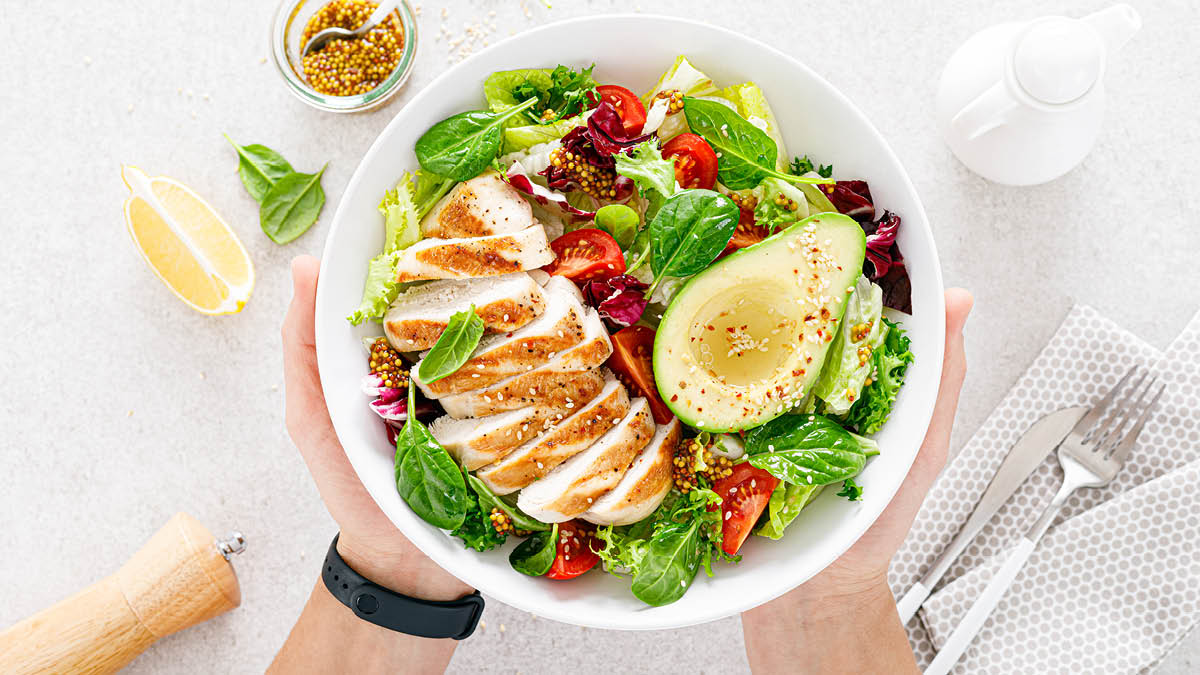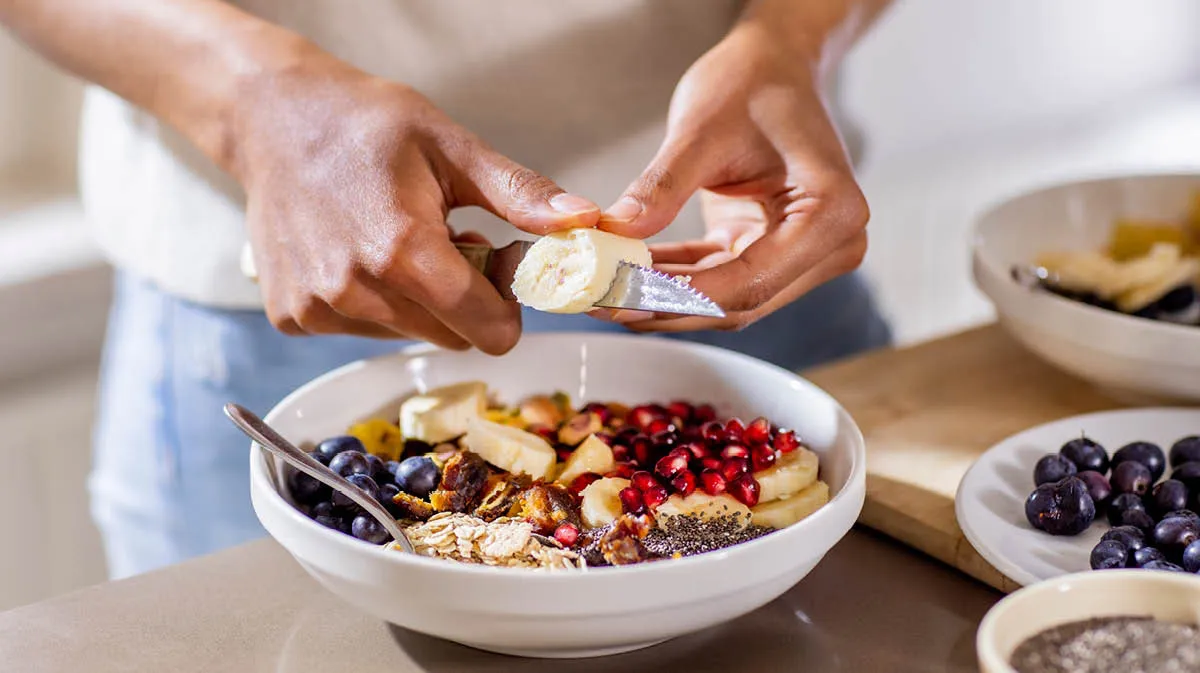Every single cell in our body contains proteins. They are the essential building block of our muscles, bones and skin and the fuel by which our bodies repair themselves. For athletes, protein is vital to recovery and increasing muscle mass; however, it is just as important for other health and well-being goals.
Protein is an essential nutrient
"In short, protein is the macronutrient that we need to build blocks in the body, predominantly muscle tissue," explains nutrition coach Graeme Tomlinson, better known to his 1,2 million Instagram followers as @thefitnesschef_.
Proteins are large molecules that play a critical role in our bodies. They are constructed out of thousands of smaller molecules called amino acids which link together in a chemical structure known as branched-chain amino acids (BCAA's). The combination of these amino acids determines its function in the body. While building muscle is perhaps the best-known function of protein, there are a range of others that will also be familiar. Perhaps the most recognisable are antibodies, which bind to viruses and bacteria to protect the body, and enzymes, which regulate almost all chemical reactions in our cells.
In total, there are 20 different types of amino acids, many of which are produced self-sufficiently by the body. However, there are some (nine to be specific) that we must obtain through our diet in order to stay healthy. These are known as essential amino acids.
You need at least one gram of protein per kilo a day
You might not even realise, but as you go about your day, your body, mainly your muscles, are constantly being broken down and rebuilt through use. Protein is the central factor in this process.
It's important that each person consumes the right amount of protein for them, which varies depending on your body type and fitness goals.
"As a minimum, if you don't have any sort of health and fitness goals, you don't have any muscle gain goals, I think one gram of protein per kilo of bodyweight per day is a good starting point just for general health", Tomlinson says.
"But if you are actively looking to gain muscle, 1,5 grams would be an ideal amount1. Some people would want to go up to two grams per kilo of body weight, which is also fine. It depends on the individual".
Do your research – how much protein is in your food?
So, you know how much protein you need, but how much food do you need to meet that amount? The easy way is to just check the packet.
"To up your protein intake, the first case is to understand that 100 grams of chicken breast is around 25 grams of protein. But it's not just meat and fish, things like cheese, which often gets demonised, is fairly protein dense," he says.
"Generally speaking, the ideal portion size per meal is around 25 to 35 grams of protein, which is actually around about a chicken breast, or maybe one and a half. So it's not a huge amount of food."
There are higher-quality and lower-quality proteins
A protein-rich diet that supplies the body with the essential amino acids is critical to our overall health. However, some protein sources, such as animal protein, do this better than others, such as plant protein.
"Plant-based people wouldn't like me saying this," says Tomlinson, "but animal protein is a higher quality protein because it contains all the branched-chain amino acids we need". The key difference between the two is that animal protein is 'complete', containing all nine amino acids that our body cannot produce naturally, while plant protein (excluding soy) is 'incomplete', as they do not contain one or more of these amino acids2.
"If you think of a steak, eggs or Greek yoghurt, all these things would be a higher quality protein.
"With plants, to achieve a diet with all nine amino acids in there, you'd have mix and match your food sources quite a bit. It is possible, but you would need to be looking at protein-dense plant-based foods, the likes of beans, tofu, tempeh, seitan", Tomlinson adds.
Whey protein can be a good and cheap alternative
The problem with some protein-dense food, particularly meat and fish, is that it can be quite expensive. Whey protein, a by-product of cheese production, is an alternative often used in the fitness world as a supplement.
"Whey protein, I would say, is a really easy way to increase protein, if you find it difficult to do so in main meals. As a convenient cheap source of dense quality protein, I don't think anything beats it, it's pretty versatile. You can have it in shakes, you can have it in porridge, you can have it in yoghurt."
However, Tomlinson does recommend you focus on eating proper meals when possible. "A diet just filled with supplements is fairly disordered, and you can actually miss out on other vital nutrients if you're missing meals."

Watch out for marketing tricks
"A lot of companies have tried to make 'high protein' versions of their existing product line. Sometimes it's fine, but other times, you've got protein bars with four grams of protein. That's not a protein bar.
"I did a comparison with a protein bar, one that has 10 grams of protein and a slice of toast with a knife's worth of peanut butter, and that had as much protein. It helps to look at the label on these things because there's a lot of mysterious things going on."
Protein is essential for fat loss
Protein is hugely important for fat loss for two main reasons. The first is more of a behavioural reason, protein tends to make us feel fuller when we eat it.
"Protein increases our satiety. A lot of scientists don't actually know why that is, but they presume it's because it's harder for us to digest. Therefore, it just means we want to go longer before we eat another meal. So this is important for fat loss because it just reduces the likelihood of eating excess calories", Tomlinson says.
The other way in which protein contributes to fat loss is down to what is called the thermic effect.
"Effectively, the thermic effect is how many calories you burn when you're digesting it. When you compare it to carbs and fats, say you had 100 calories of each, for carbohydrates, you would be burning about 10 of those calories you'd be taking in 90. For fats, its virtually zero, maybe like one or two. But for protein, you're burning 25 to 30 of those calories when you're digesting it3. So it's significantly higher.
"So it's not that you take in less calories, it's just that your energy expenditure increases the higher protein diet that you have."



